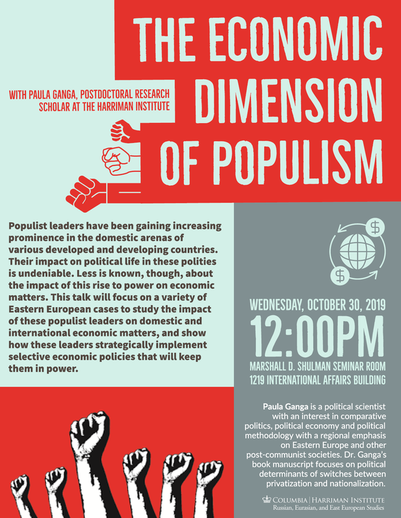Populism, Illiberalism and Economic Nationalism
Bringing the State Back In. Populism and Economic Nationalism in Europe

Abstract: What are the economic consequences of electing populist leaders? In this article I argue that in the economic arena, increased policies of economic nationalism and a statist approach accompany populist governments. I examine this phenomenon both quantitatively with an analysis of governments in 30 European countries since 1990 as well as qualitatively in the countries of Hungary and Poland. The economic concentration taking place in sectors such as banking and investment and its use to further these regimes’ ability to stay in power is emblematic of the populist worldview and can be seen clearly in these countries and elsewhere. Beyond this domestic agenda I also show how populist leaders have learned to selectively pick those parts of globalization that are most likely to sustain their regime. I conclude with a discussion of the sustainability of the populist economic agenda especially considering increased demands for economic nationalism by populist parties in the guise of “pandemic nationalism” across Europe since the beginning of COVID-19.
(Presented at APSA 2017, ISA 2019, under review)
(Presented at APSA 2017, ISA 2019, under review)
Economic Consequences of Illiberalism, Chapter in the Routledge Handbook of Illiberalism
As increasing numbers of illiberal leaders have been accessing the highest seats of power across the globe, systematically analyzing their time in government has become a policy necessity. This chapter examines the economic consequences of having governments in office espousing illiberalism in their approach to politics. By examining the economic policies enacted by illiberal governments in several Eastern European governments with an eye for comparative extension of this analysis, this chapter builds an initial theoretical framework for illiberal economics based on statism and economic nationalism within a globalized system of politics.
Economic Nationalism Goes Global: Illiberal Governments Instrumentalizing Globalization in Eastern Europe, Article in the Journal of Illiberalism Studies
What are the consequences of electing illiberal leaders for the liberal international order? Traditional responses suggest they either want to increase their influence or change it radically. By understanding the illiberal domestic agenda of economic nationalism and statism in a world of increased financialization, I argue that the economic concentration taking place domestically will result in illiberal leaders instrumentalizing globalization for their political survival. This means these leaders have learned to selectively pick those parts of globalization most likely to sustain their regime—for example, criticizing multilateral organizations such as the European Union while reaping the benefits of EU membership. In this article, I begin by examining the trend of illiberal governments toward economic nationalism and statism. I then theorize the nuanced ways in which illiberal leaders still use the liberal order for their political survival—in spite of espousing an illiberal economic agenda. I examine this phenomenon with an emphasis on illiberal leaders in Hungary and Poland and provide evidence from the last two decades of economic and political developments in Eastern Europe, as well as explore the impact of the covid-19 pandemic and the recent war in Ukraine on the future of illiberal leaders’ approach to globalization.
Populist Leaders and Political Scandals: Kiss of Death or Elixir of Life?
with Tsveta Petrova (Columbia University)
Ethno-populists often come to power criticizing the establishment for being plagued by corruption but after assuming office, the ethno-populists themselves frequently become implicated in corruption and other scandals. We use an original scandal-event dataset compiled from traditional media sources from Hungary and Poland spanning the period of 2000 to 2022 and we find little evidence that ethno-populist incumbents have been hurt by the scandals exposing their wrongdoing. Instead, we document a significant, short-term rally effect among their supporters. Media pluralism, robust opposition, and a bad economy diminish this effect. In contrast, scandals implicating the opponents of ethno-populists boost support for them.